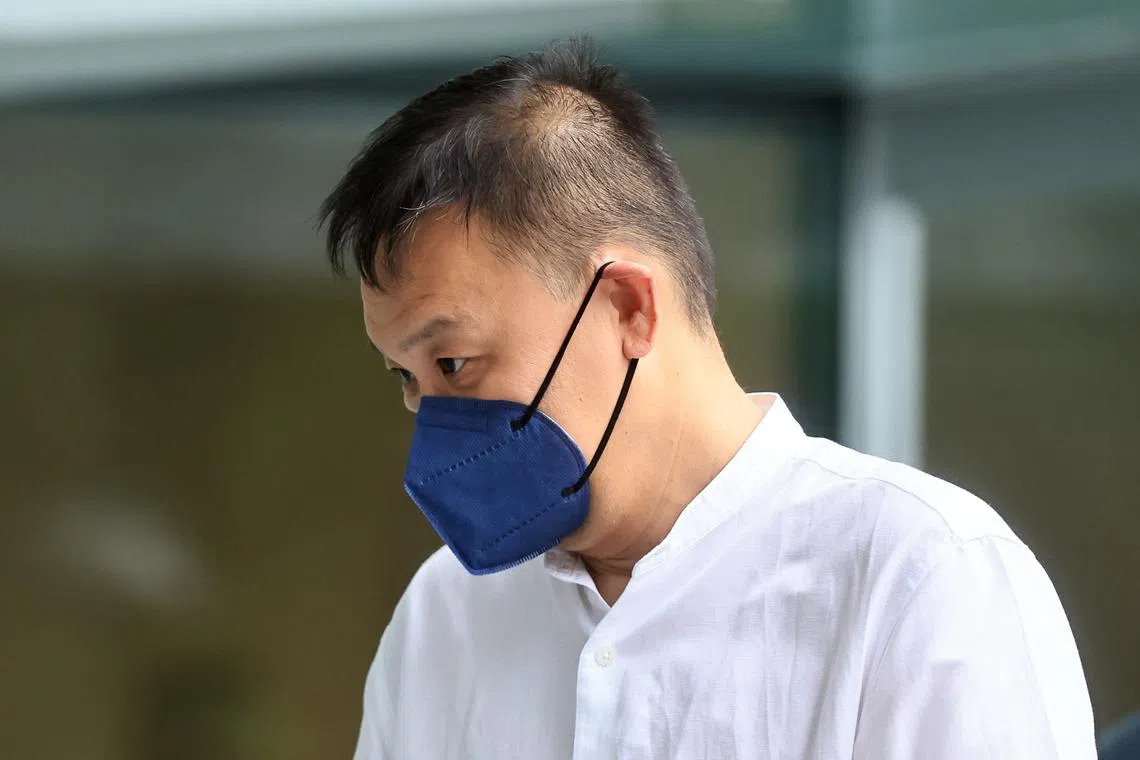Jail for parallel importer who forged Vicom test results to register new vehicles
Sign up now: Get ST's newsletters delivered to your inbox

Lim Tze Yong was sentenced to 16 months’ jail on Dec 5, after he pleaded guilty to five charges of forgery for the purpose of cheating.
ST PHOTO: KELVIN CHNG
Follow topic:
SINGAPORE – Back when looming Covid-19 restrictions were affecting slots for compliance tests for vehicles, the director of a parallel importing company decided to forge documents to meet contractual deadlines to customers.
Lim Tze Yong, 50, was sentenced to 16 months’ jail on Dec 5, after he pleaded guilty to five charges of forgery for the purpose of cheating.
Nine other similar charges were taken into consideration during his sentencing.
Lim’s parents were then also directors at Bestlink Auto, which mainly deals with the parallel import and sale of motor vehicles, and also provides chartered bus services.
Deputy Public Prosecutor Theong Li Han said Lim forged at least 14 vehicle inspection test reports, which Bestlink submitted when registering brand new imported vehicles with the Land Transport Authority (LTA).
Lim had submitted the forged reports as part of 10 applications made by Bestlink to LTA between July 13, 2018, and March 14, 2020, each for the registration of a batch of technically identical imported vehicles.
Such documents are required to show that each vehicle in the batch meets the required exhaust emission standards, and the reports include data on the vehicle’s carbon dioxide output and fuel efficiency.
To get these reports, an importer can send the vehicles to the emission test laboratory at Vicom, a vehicle inspection company. The lab issues a set of three reports after testing, which costs at least $2,500 per vehicle.
Bestlink had booked slots for some of the vehicles to be tested at the emission test laboratory, but failed to send the vehicles for testing at the appointed time due to an oversight.
As a Covid-19 lockdown was imminent at the time, there were no other testing slots available that would have allowed Bestlink to meet its deadlines to deliver the vehicles to its customers and thus collect deposits on the sales.
Lim then came up with the idea of creating and submitting forged test reports to LTA so that his company could meet its contractual obligations.
He used a PDF file editor to edit the chassis numbers on genuine test reports that Bestlink had previously got from the laboratory to those of the vehicles listed in the applications.
He then submitted the 14 forged test reports to LTA so as to deceive it into issuing in-principle approvals to Bestlink for the registration of the imported vehicles.
This was likely to cause harm to LTA’s reputation by undermining the integrity of its vehicle registration system, DPP Theong said.
On July 16, 2020, LTA lodged a police report against Bestlink, stating that its vehicle approval and control division discovered that the company had submitted documents which appeared to have been forged.
DPP Theong said that as a result of the in-principle approvals, Bestlink could get 19 vehicles to the next stage of the vehicle registration process quicker.
The company also saved time and money as it did not send vehicles to the lab for testing or wait to get genuine reports. It also saved another $3,500 by not paying for genuine test reports.
For each charge of forgery for the purpose of cheating, Lim could have been jailed for up to 10 years, fined, or both.


